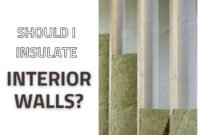Exterior walls and attics must be insulated, as we all know. But what about interior walls, especially existing walls within a home? Interior wall insulation, which involves insulating the inside face of external walls, can be beneficial.
While some may believe that insulating interior walls is unnecessary, it can significantly aid in energy efficiency and soundproofing, particularly in older homes where existing walls may lack adequate insulation.
Moreover, insulating interior walls, including existing walls, can help smoothen heat transfer between rooms, leading to more consistent temperatures throughout the home.
It also plays a crucial role in moisture control inside the room, preventing the buildup of dampness and mold, which is especially important in areas with high humidity.
Yes, of course insulating the interior walls will bring some benefits eventually. But the real question is, do you need insulation in interior walls?
Well, to help you decide, let’s explore the pros and cons of insulating interior walls, especially when it comes to existing walls in your home. Understanding these aspects will help you make an informed decision about whether this type of insulation is right for your specific situation.
Do Interior Walls Need Insulation: Pros and Cons
- Pros: Energy Saving
Insulation in the external walls and roof is well established to save energy by reducing reliance on conventional heating or cooling. However, insulating interior walls, including existing walls, can also contribute significantly to energy savings.
This is particularly true in homes where the existing walls may have gaps or lack sufficient insulation, leading to increased energy bills. With interior wall insulation, you can create climatic zones within a room for more efficient cooling and heating inside your house.

Read also: Rockwool Insulation vs Fiberglass
Internal wall insulation will prevent heat or cool air from transferring into or out of the occupied room. You just need to close the door of the unoccupied room. This is significantly more efficient than trying to cool or heat the entire house artificially. It is an excellent approach to better energy efficiency.
- Pros: Sound Proofing
If you require a more tranquil living environment, then interior wall insulation is needed. Sound transfer from room to room is reduced by insulating inner walls. It can act as a sound barrier, containing inside noises while muzzling undesirable outside noise better than just insulating external walls.
- Cons: Add Cost
Insulation in interior walls indeed needs an extra cost. The additional cost varies depending on the material you use for insulating interior walls. Generally, the interior wall insulation will cost in the range of $40 to $50 per m2, but it might cost more than $100 per m2 when a wall is already installed, including materials and installation.
- Cons: Minimize your room size
Another disadvantage of insulating the interior wall is it could take up more space in your room. The material used will eventually thicken your walls. Insulation boards can add up to 10cm to the thickness of your wall.
Best Insulation for Interior Walls
What is the most appropriate insulation for the interior wall will depend on the application, so you need to know better what you require.
If you need insulation that doesn’t take up too much space, use a rigid foam board or consider mineral wool, which is effective yet less bulky. However, be aware that this kind of insulation material might stretch your budget as it is relatively more expensive.
If you want more breathable insulation, you can choose natural materials such as wood fiber, sheep’s wool, or mineral wool. These options are also considered more eco-friendly and fire retardant, releasing fewer harmful substances.
Read also: What Is R-13 Insulation Used For?
When considering insulation for interior walls, it’s crucial to understand the specific needs of your space and the benefits each type of insulation can offer. Whether it’s for energy efficiency, soundproofing, or moisture control, the right insulation can make a significant difference in the comfort and functionality of your home.
So, the answer to ‘Do interior walls need insulation’ is dependent on your requirements, budgetary constraints, and local building codes. To ensure compliance, it’s important to check these building codes when insulating existing interior walls.


